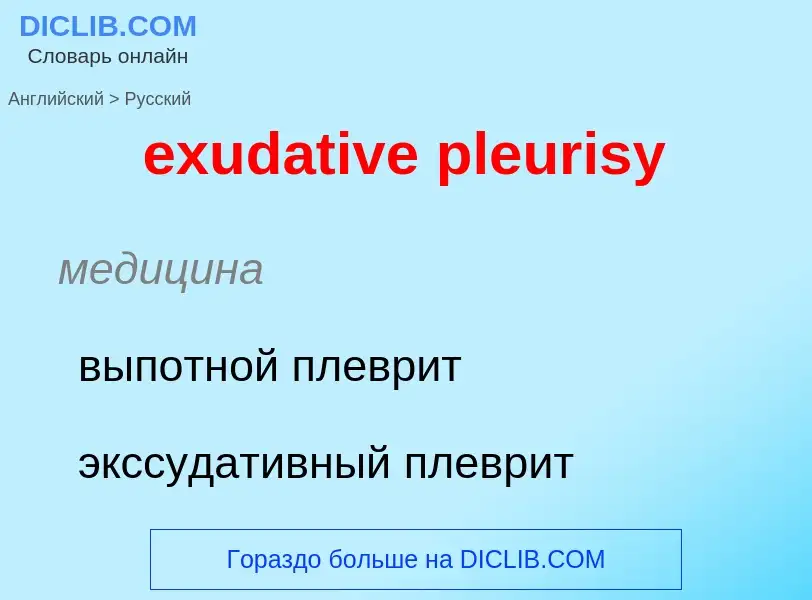Traducción y análisis de palabras por inteligencia artificial ChatGPT
En esta página puede obtener un análisis detallado de una palabra o frase, producido utilizando la mejor tecnología de inteligencia artificial hasta la fecha:
- cómo se usa la palabra
- frecuencia de uso
- se utiliza con más frecuencia en el habla oral o escrita
- opciones de traducción
- ejemplos de uso (varias frases con traducción)
- etimología
exudative pleurisy - traducción al ruso
медицина
выпотной плеврит
экссудативный плеврит
[plu(ə)'ritik]
медицина
плевритический
прилагательное
медицина
плевритный
['plu(ə)risi]
медицина
плеврит
существительное
медицина
плеврит
Definición
Wikipedia

Pleurisy, also known as pleuritis, is inflammation of the membranes that surround the lungs and line the chest cavity (pleurae). This can result in a sharp chest pain while breathing. Occasionally the pain may be a constant dull ache. Other symptoms may include shortness of breath, cough, fever, or weight loss, depending on the underlying cause. Pleurisy can be caused by a variety of conditions, including viral or bacterial infections, autoimmune disorders, and pulmonary embolism.
The most common cause is a viral infection. Other causes include bacterial infection, pneumonia, pulmonary embolism, autoimmune disorders, lung cancer, following heart surgery, pancreatitis and asbestosis. Occasionally the cause remains unknown. The underlying mechanism involves the rubbing together of the pleurae instead of smooth gliding. Other conditions that can produce similar symptoms include pericarditis, heart attack, cholecystitis, pulmonary embolism, and pneumothorax. Diagnostic testing may include a chest X-ray, electrocardiogram (ECG), and blood tests.
Treatment depends on the underlying cause. Paracetamol (acetaminophen) and ibuprofen may be used to decrease pain. Incentive spirometry may be recommended to encourage larger breaths. About one million people are affected in the United States each year. Descriptions of the condition date from at least as early as 400 BC by Hippocrates.



![The illustration shows a person undergoing [[thoracentesis]]. The person sits upright and leans on a table. Excess fluid from the pleural space is drained into a bag. The illustration shows a person undergoing [[thoracentesis]]. The person sits upright and leans on a table. Excess fluid from the pleural space is drained into a bag.](https://commons.wikimedia.org/wiki/Special:FilePath/Thoracentesis.jpg?width=200)
